
Edwin Rosskam Shoeshine, 47th Street, Chicago’s main Negro business street 1941

As the potential and existing economic and political disruption sinks in, everyone comes with their own re-inventions of the wheel. Predictable behavior. The US and UK can still stumble their way towards a worse outcome than necessary, but Italy no longer has such freedom. They made their big mistakes a few weeks ago.
And as politicans get measures, supplies and treatments wrong, they still have room left for gigantic mistakes is responding to economic consequences. Stuck as they may be bewteen the 2-3 weeks they tell you this will last and the many months they say it will.
Unless someoe stops them real soon, they will spend, trillions this time, bailing out banks and large companies that only exist to a large extent because they were bailed 12 years ago as well, and let the people rot away. But then, who are the main campaign contributors?
• Cases 184,133 (+ 13,281 from yesterday’s 170,852)
• Deaths 7,182 (+ 656 from yesterday’s 6,526)
From Worldometer yesterday evening (before their day’s close)
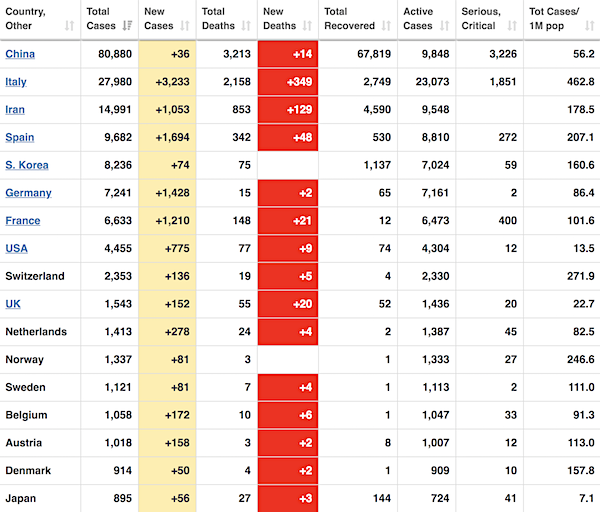
From Worldometer (NOTE: mortality rate is back up to 8%!)
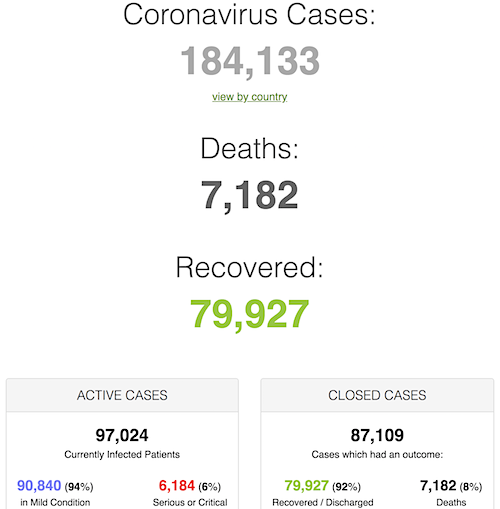
From SCMP: (Note: the SCMP graph was useful when China was the focal point; they are falling behind now)
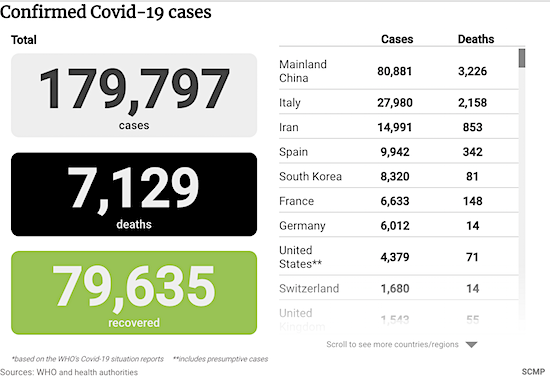
From COVID2019.app: (New format lacks new cases and deaths)
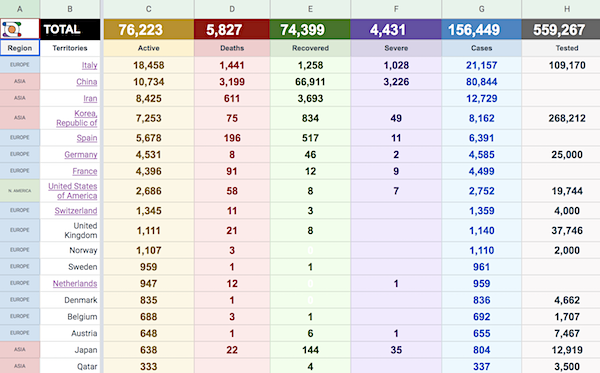

Steve Keen

What it will look like.
• A View From Italy’s Coronavirus Frontline (G.)
There are the elderly couples who died hours apart and without their families around them. There is the 47-year-old woman who died at home, and who remained there for almost two days because funeral companies refused to collect her body. There are the doctors who lost their lives after assisting their infected patients. Among the 2,158 people to have been killed by the coronavirus pandemic in Italy as of Monday, the oldest was 95 and the two youngest were 39. “The reality is this virus is spreading like wildfire. Death is not certain, but the contagion is real,” said Luca Franzese, whose sister, Teresa, 47, died at home in Naples on 7 March. “My parents are heartbroken, they are destroyed..”
Teresa, who lived with her elderly parents, sister, brother-in-law and their two children, suffered from epilepsy but was otherwise in good health. A week before she died, she came down with the flu. “My parents called her doctor but they refused to come to the house despite knowing she had a disability,” said Franzese. “She went into a coma on 7 March, we tried to call the emergency hotline, they arrived after 40 minutes. In the meantime, I tried to give her mouth-to-mouth resuscitation.” Teresa tested positive for the virus postmortem. Franzese spoke of his family’s frustration at being “abandoned” by the authorities after his sister was left to die at home.
It was only after he made an appeal for help via Facebook that a local funeral company eventually came to collect her body. But as with other coronavirus victims, she was buried quickly and without ceremony to mitigate the risk of infection posed by her corpse. Her parents, who have underlying health issues, tested negative for the virus, as did Luca and a nephew. The rest of Teresa’s immediate family of seven have tested positive. [..] not all of the dead had other health issues, at least as far as is known. Luca Carrara lost his father, Luigi Carrara, 86, and mother, Severa Belotti, 82, within a few hours of each other. He told the Italian press they were in good health. “I was unable to see my parents, they died alone, that’s what this virus is,” he added. “The truth is this is not a banal flu and if you end up in hospital, you leave either alive or dead.”
https://twitter.com/i/status/1239741543654834179

Actual headline (way too long): The UK Only Realised “In The Last Few Days” That Its Coronavirus Strategy Would “Likely Result In Hundreds of Thousands of Deaths””
Richard Horton, editor of The Lancet, tweets: “It said it took a study from Imperial to understand the likely burden of COVID-19 on the NHS. But read the first paper we published on COVID-19 on Jan 24. 32% admitted to ITU with 15% mortality. We have wasted 7 weeks. This crisis was entirely preventable.”
• The UK Only Woke Up “In The Last Few Days” (BF)
The UK only realised “in the last few days” that attempts to “mitigate” the impact of the coronavirus pandemic would not work, and that it needed to shift to a strategy to “suppress” the outbreak, according to a report by a team of experts who have been advising the government. The report, published by the Imperial College COVID-19 Response Team on Monday night, found that the strategy previously being pursued by the government — dubbed “mitigation” and involving home isolation of suspect cases and their family members but not including restrictions on wider society — would “likely result in hundreds of thousands of deaths and health systems (most notably intensive care units) being overwhelmed many times over”.
The mitigation strategy “focuses on slowing but not necessarily stopping epidemic spread — reducing peak healthcare demand while protecting those most at risk of severe disease from infection”, the report said, reflecting the UK strategy that was outlined last week by Boris Johnson and the chief scientific adviser Patrick Vallance. But the approach was found to be unworkable. “Our most significant conclusion is that mitigation is unlikely to be feasible without emergency surge capacity limits of the UK and US healthcare systems being exceeded many times over,” perhaps by as much as eight times, the report said. In this scenario, the Imperial College team predicted as many as 250,000 deaths in Britain.
“In the UK, this conclusion has only been reached in the last few days,” the report explained, due to new data on likely intensive care unit demand based on the experience of Italy and Britain so far. “We were expecting herd immunity to build. We now realise it’s not possible to cope with that,” professor Azra Ghani, chair of infectious diseases epidemiology at Imperial, told journalists at a briefing on Monday night. As a result, the report — which its authors said had “informed policymaking in the UK and other countries in the last weeks” — said: “We therefore conclude that epidemic suppression is the only viable strategy at the current time.”
A suppression strategy, along the lines of the approach adopted by the Chinese authorities, “aims to reverse epidemic growth, reducing case numbers to low levels and maintaining that situation indefinitely”. It requires “a combination of social distancing of the entire population, home isolation of cases and household quarantine of their family members”, and “may need to be supplemented by school and university closures”. An “intensive intervention package” will have to be “maintained until a vaccine becomes available (potentially 18 months or more)“, the report said, painting an extraordinary picture of what life could be like in the UK for the next year and a half.

And in a country as screwed up as Britain, jail is the last place to be.
“An Iranian judiciary spokesman says the country has temporarily freed about 85,000 prisoners, including political prisoners, in an attempt to prevent the spread of coronavirus.”
• Julian Assange’s Mother Calls For His Immediate Release Over COVID19 Fears (ES)
The mother of imprisoned WikiLeaks founder Julian Assange has appealed for his immediate release from Belmarsh Prison over fears he could catch coronavirus while behind bars. Christine Assange’s plea came after a leading prison boss warned last week that the worsening Covid-19 epidemic will kill inmates throughout the UK, describing the conditions inside jails as a fertile breeding ground for the virus. Coronavirus cases have surged throughout the UK in recent days, with 14 more deaths confirmed on Sunday.
More than 1,500 people nationwide have tested positive for the virus since the outbreak began, but officials say the true figure of people with the disease is likely to be far higher. In a series of posts on social media, Ms Assange described her son as being “weak from chronic illness” and implored Britons and Americans to push politicians into action over his case. Those with underlying health conditions are more at risk of contracting the virus.
Only YOU can free my son
YOU.. not lawyers, celebs, academics or intellectuals.
A political persecution requires a political solution.
Millions of you contacting your own MP/Senator/Congress Rep who needs YOUR vote
A phone call, visit, posted letter is most effective
— Mrs Christine Assange #FreeAssange (@MrsC_Assange) March 15, 2020

Be kind.
• Americans Get a Taste of Life Under Sanctions (MPN)
Across fifty states, Americans are collectively bracing for the incoming COVID-19 pandemic to hit. In the face of the virus, people are resorting to panic buying, stocking up on vital foods and goods, leading to pressing shortages of key products like hand sanitizer and toilet paper. Perhaps more concerning, however, is that health experts all agree that the country is ill-equipped for the coming medical emergency. “We are not prepared, nor is any place prepared for a Wuhan-like outbreak,” said Dr. Eric Toner of Johns Hopkins Center for Health Security. “And we would see the same sort of bad outcomes that they saw in Wuhan – with a very high case fatality rate, due largely to people not being able to access the needed intensive care.”
Chief among the problems is a lack of ventilators, a crucial machine to help critically ill patients breathe properly. New York City, for example, has barely one sixth of the ventilators it would need for a critical outbreak. If things get truly bad, the city has drafted laws to compel prisoners at Rikers Island jail to dig mass graves. One of the principal reasons why the U.S. is so unprepared is that it spends so little on public health in comparison with what it spends on war. The U.S. military’s projected budget is $934 billion per year, the Pentagon’s is $712 billion. In contrast, the Center for Disease Control (CDC) costs the taxpayer only $6.6 billion. At a time of crisis, many Americans are reassessing which organization they feel is truly protecting them from danger. While increasing the military budget, President Trump has consistently argued for cuts to the CDC. Amazingly, the Trump administration confirmed last week that it intends to slash funding from the body, even as the country begins reeling from the impact of COVID-19.
The crippling shortages, inability to move and the likely overwhelming of medical services will give Americans a taste of what it is like to live under sanctions that it imposes on a number of countries worldwide. U.S. sanctions on Venezuela, declared illegal and a “crime against humanity” by the United Nations, are conservatively estimated to have killed more than 40,000 people between 2017 and 2018 alone. Diabetics, for example, have been unable to get insulin because of the embargo, leading to mass deaths. The Cuban government estimates that the American embargo has cost it over $750 billion. Meanwhile, Iran, wracked by the virus that has caused more than 850 confirmed deaths, has been decimated by Trump’s increased sanctions.
The Iranian rial lost 80 percent of its value, food prices doubled, and rents and unemployment soared. Because of the sanctions, patients with conditions like leukemia and epilepsy have been unable to get treatment. After the coronavirus hit it, no country would sell the Islamic Republic basic medical supplies like masks, fearful of reprisals from the world’s only superpower. The shortages are so bad that doctors are being forced to share facemasks with other hospital staff. Eventually the World Health Organization stepped in and began supplying Iran directly. The Iranian government also invented an app to deal with COVID-19, hoping to share information with its citizens to help fight its spread but Google removed it from its app store citing the sanctions that prevent it from promoting anything Iranian-made. The effect of the sanctions in helping spread COVID-19 across Iran and beyond is immeasurable.
The ongoing sanctions on Iran amid the coronavirus outbreak is mass murder pic.twitter.com/ZhuKu66MRk
— Rania Khalek (@RaniaKhalek) March 16, 2020

Why is it taking so long? Could it be because these industries pay for campaigns?
• De Blasio Urges ‘Nationalization’ Of Key Industries (Fox)
New York City Mayor Bill de Blasio is arguing that the best way to tackle the coronavirus outbreak is for the federal government to take over critical private companies in the medical field and have them running 24 hours a day. The mayor, who made multiple media appearances over the weekend, said that the current situation calls for drastic measures which include nationalizing certain industries. “This is a case for a nationalization, literally a nationalization, of crucial factories and industries that could produce the medical supplies to prepare this country for what we need,” de Blasio told MSNBC’s Joy Reid on Saturday, calling for “24/7 shifts” during what he called a “war-like situation.”
The following day, de Blasio reiterated this message, telling CNN that “the federal government needs to take over the supply chain right now.” He specified the need for companies that make ventilators, surgical masks, and hand sanitizers to be taken over and made to work around the clock. New York state already has started producing hand sanitizer in response to shortages and price gouging. The city itself has also taken drastic steps to deal with the crisis, forcing restaurants to limit themselves to takeout and delivery service, and closing many establishments to prevent the spread of the virus through crowds. The mayor predicted that coronavirus will continue to be a problem “for at least six months.” Sunday evening, it was announced that New York City schools will be shutting down until at least April 20, a measure de Blasio previously had resisted, despite facing pressure to do so.

Temporarily, but better than nothing.
• Spain Takes Over Private Healthcare Amid More Lockdowns (G.)
In Spain, where the coronavirus toll climbed to 309 on Monday with 9,191 confirmed cases, the government announced sweeping measures allowing it to take over private healthcare providers and requisition materials such as face masks and Covid-19 tests. The health minister, Salvador Illa, said private healthcare facilities would be requisitioned for coronavirus patients, and manufacturers and suppliers of healthcare equipment must notify the government within 48 hours. The Spanish government declared a state of emergency on Saturday, placing the country in lockdown and ordering people to leave their homes only if they needed to buy food or medicine or go to work or hospital. The transport minister, José Luis Ábalos, said it was “obvious” the measures would be extended beyond the planned 15-day period.

Romney is but a follower. Tulsi Gabbard started this. House Resolution HRes 897.
• Mitt Romney’s Coronavirus Economic Plan: $1,000 To Each American Adult (Vox)
On Monday, Sen. Mitt Romney, the Utah Republican and former GOP presidential nominee, called for $1,000 cash payments to every American adult as coronavirus measures to keep people in their homes threaten to put millions out of work. “While expansions of paid leave, unemployment insurance, and SNAP benefits are crucial, the check will help fill the gaps for Americans that may not quickly navigate different government options,” Romney argued in a press release. This, to be clear, is not the same as Yang’s proposal. Yang wanted monthly checks as a regular government policy, while Romney is supporting a one-off $1,000 check as an emergency measure. In that context, $1,000 might not be enough:
Former Obama chief economist Jason Furman has proposed payments of as much as $3,000 per adult and $1,500 per child. But the fact that a conservative Republican is proposing unrestricted cash payments during a GOP administration – in which even heavily regulated government programs like food stamps are under attack – is notable. And Romney is not alone in this. Sen. Tom Cotton (R-AR), one of the most conservative members of the Senate GOP and a likely future presidential contender, went on Fox & Friends on Monday morning to call on Congress to dispense with complicated mechanisms like tax credits and instead put “cash in the hands of affected families”:
The House bill sets up a complicated relief system that relies on paid sick leave & refundable tax credits.
That won’t move quickly enough & puts undue pressure on businesses to lay off workers.
We don’t want to see layoffs—we need cash in the hands of affected families. pic.twitter.com/64hNtYhfJO
— Tom Cotton (@SenTomCotton) March 16, 2020
Some Democrats not in leadership have also been pushing their own versions of this idea. There is already a cash bill in the House from Democratic Reps. Tim Ryan and Ro Khanna that would give at least $1,000 to every American making under $65,000, and as much as $6,000 to some families with children. Harvard economist Greg Mankiw, who served as chief economist to President George W. Bush, has argued that cash payments are needed not so much to stimulate the economy as to help people whose jobs are impossible to perform due to social distancing. It’s a humanitarian measure, not a stimulus measure.
“Financial planners tell people to have six months of living expenses in an emergency fund. Sadly, many people do not,” Mankiw writes on his blog. “Considering the difficulty of identifying the truly needy and the problems inherent in trying to do so, sending every American a $1000 check asap would be a good start. A payroll tax cut makes little sense in this circumstance, because it does nothing for those who can’t work.”
https://twitter.com/i/status/1238516118391791617

Interesting for 2021, perhaps. Not now.
• Chinese Scientists Find Infected Monkeys Developed Immunity (SCMP)
Scientists who infected monkeys with the coronavirus that causes Covid-19 have found that those that recovered developed effective immunity from the disease – a potentially important discovery in the race to develop a vaccine. But the researchers also found that the animals could become infected through their eyes, which means wearing a face mask may not be enough to protect people from the disease. Scientists around the world have been racing to develop a vaccine and the first clinical trials could be held in China and the US within a month. But a number of cases, where people who had tested negative for the disease and were discharged from hospital only to give a positive result a few days later, have cast doubt on the process.
The rate of reoccurrence ranged from 0.1 to 1 per cent nationwide, according to China’s state media reports. However, in some provinces such as Guangdong up to 14 per cent of the discharged patients had reportedly returned to hospital because of the test results. If it turns out that these patients had been reinfected by the same virus, then vaccines will not prove effective. But the monkey experiment carried out by a team from the Chinese Academy of Medical Sciences may help dispel that fear. [..] after tests returned negative results and X-rays showed their internal organs had fully recovered, two monkeys were dosed with the virus through the mouth. The scientists recorded a temporary temperature rise, but other than that everything appeared to stay normal. Autopsies were performed on these two monkeys about two weeks later, and the researchers could not find a trace of the virus in their body.
[..] Professor Zhong Nanshan, a leading government scientist, said in Guangzhou last week that they had found a strong presence of antibodies in recovered patients, which meant the virus could no longer use them as a carrier again. “Now the question everyone cares about is whether the close contacts and family members may be infected because [the patient] tested positive again. So far I have not seen any evidence,” Zhong said.

People first, not businesses. Wage subsidies for companies is not the way to go. Give people the money, so companies don’t have to pay them, move the salary burden from their books.
• New Zealand Launches Massive Spending Package To Combat COVID-19 (G.)
New Zealand’s government has announced a spending package equivalent to 4% of GDP in an attempt to fight the effects of Covid-19 on the economy, in what ministers called the most significant peace-time economic plan in the country’s modern history. It includes covering wages for people who are required to self-isolate but cannot work from home, or those caring for relatives who are sick with the virus, even if they are not sick or do not test positive for Covid-19. “This package is one of the largest in the world on a per capita basis,” Grant Robertson, the finance minister, told reporters at New Zealand’s parliament on Tuesday. On Tuesday, authorities began spot checks on travellers, with two people arriving from south-east Asia already facing deportation for failing to self-isolate.
Stephen Vaughan at Immigration NZ said: “This kind of behaviour is completely irresponsible and will not be tolerated which is why these individuals have been made liable for deportation.” The NZ$12.1bn stimulus includes wage subsidies, bolstering the healthcare sector’s response to the virus, more money for low-income families and those on social welfare, and changes to business tax. New Zealand has only eight confirmed and two probable cases of Covid-19. But a decision to impose strict travel restrictions on the weekend – requiring almost all travellers arriving from anywhere to self-isolate for 14 days – is expected to wreak havoc on business, especially in the country’s tourism sector, New Zealand’s biggest export earner. Businesses hard-hit by the virus – experiencing more than a 30% decline in revenue compared to last year – will be eligible to receive wage subsidies to keep paying staff.

Disband itself.
• What The ECB Must Do To Save The Euro Zone Economy (SCMP)
It doesn’t take much to expose the flaws in the euro zone economy but the coronavirus epidemic has already ripped asunder any hope of getting back to sounder growth for a long time. Europe is clearly heading into recession as the pandemic takes a heavy toll on consumer demand, business activity and financial market confidence. We are heading into uncharted territory with the national lockdowns in Italy and Spain foreshadowing bigger trouble ahead for Europe’s largest economies, Germany and France, with plenty of negative spillover likely for the rest of the region. Just how deep the recession descends depends upon how effectively Europe’s policymakers respond. Judging by the official response so far, it’s no surprise markets are panicking.
Europe’s bond and credit markets are definitely showing the strain. It’s not so much that Germany’s yield curve has turned negative on safe-haven and flight-to-quality flows, but that bond spreads for riskier markets have started to surge. The bellwether 10-year spread of Italian government bonds over equivalent German yields has exploded out to 2.34 per cent in recent days as investors have fled for cover. Talk about Italy’s “doom loop” has resurfaced again, with deepening recession risk, the fragility of the Italian banking sector and the potential threat of future credit default combining to put the wind up the markets. It hasn’t helped that the European Central Bank seems to be turning its back on the bond market’s plight.
Serbian President: "The only country that can help us is China."
“By now, you all understood that European solidarity does not exist. That was a fairy tale on paper. I believe in my brother and friend Xi Jinping, and I believe in Chinese help."
— Rush Doshi (@RushDoshi) March 16, 2020

27 countries, 27 different policy sets. What EU?
• EU Calls For 30-Day Ban On Foreigners Entering Bloc (G.)
The European commission has proposed a 30-day ban on foreigners entering the bloc as EU governments imposed closures and lockdowns rarely seen outside wartime in a continuing effort to curb the rapid spread of the coronavirus outbreak. As the head of the World Health Organization, Tedros Adhanom Ghebreyesus, urged countries to “test, test, test” for the virus, saying it “cannot be fought blindfolded”, the commission president called for an end to all non-essential travel to Europe. “The less travel, the more we can contain the virus,” Ursula von der Leyen said. “We think non-essential travel should be reduced right now in order to not spread the virus further, be it within the EU or by leaving the EU.”
Von der Leyen said the restrictions – which would not apply to UK nationals – should last for 30 days initially but may be extended if necessary. Permanent EU residents, family members of EU nationals, diplomats, doctors and coronavirus researchers would also be exempted, she said. Officials said the move, which could be approved by leaders in a video conference on Tuesday, was aimed mainly at removing the need for national controls at borders between the 26 members of the passport-free Schengen zone. Germany, which has recorded 5,813 cases and 13 deaths from Covid-19, introduced border controls with Austria, Denmark, France, Luxembourg and Switzerland on Monday, allowing through only those with a valid reason for travel such as residents, cross-border commuters and delivery drivers.
In line with a growing number of EU countries, the federal government and state leaders also agreed to close almost all shops except food stores, banks, pharmacies and petrol stations, ban religious gatherings, shutter hotels and restrict visits to hospitals and care homes. Schools in most German states were closed and Bavaria declared a disaster situation to allow the state’s authorities to push through new restrictions faster. The German president, Frank-Walter Steinmeier, urged citizens to limit their social contacts. “Restrictions on our lives today can save lives tomorrow,” he said.

“Something old and played-out is limping offstage, and something new is stepping on. Aren’t you glad you watched all those debates?”
• Things Have Changed (Kunstler)
Where does this all lead? Eventually, to a land and a people who operate their society in a very different way at a much more modest scale. The task of reorganizing our national life is immense. (There will be plenty to do, so don’t worry about that.) You can forget about the grandiose techno-narcissistic visions of electrified motoring and a robotic nirvana of perpetual sex-crazed leisure. Everything we do has to be downscaled, from whatever manufacturing we can cobble back together to rebuilding commercial ecosystems at a finer grain from region to region — in other words, what we now call small business, geared locally.
Expect giant AgriBiz to founder on a shortage of capital, especially, and expect smaller farms to organize emergently, worked by more humans working together. That is, if we want to keep eating. Expect the small towns in the well-watered parts of the country to revive while the groaning metroplexes spiral down into entropic sclerosis. Consider the value of our vast inland waterway system and the opportunities to move goods on them, when the trucking industry unravels. Consider lending a hand at rebuilding the railroad system in this country.
There will be economic roles and social roles for all those willing to step up to some responsibility. Young people may see tremendous opportunity replacing the wounded economic dinosaurs wobbling across the landscape. It’ll be all about going local and regional and making yourself useful in exchange for a livelihood and the esteem of others around you — aka, your community. Government has been working tirelessly to make itself superfluous, if not completely ineffectual, impotent, and rather loathsome in the face of this crisis that has been slowly-but-visibly building for half a century. Something old and played-out is limping offstage, and something new is stepping on. Aren’t you glad you watched all those debates?

But don’t worry, the New York Times already runs an article entitled: “Can Russia Use the Coronavirus to Sow Discord Among Americans?”
How can anyone continue to read that rag?
• DOJ Drops Charges Against Russian Troll Farm for 2016 Election Meddling (L&C)
And after all of that, the Russian troll farm’s American lawyers have the last laugh? The U.S. Attorney’s Office for the District of Columbia led by former William Barr aide Timothy Shea has filed a motion to dismiss the case against Concord Management and Consulting LLC, which has often been referred to as the Russian troll farm defendant. Concord Management was one of many people or entities charged in a Feb. 2018 indictment by then-special counsel Robert Mueller during his investigation into Russian interference in the 2016 election. Thirteen Russians and three companies were charged in the indictment. Federal prosecutors now want to dismiss their case against Concord Management.
“The United States will continue its efforts to apprehend the individual defendants and bring them before this Court to face the pending charges, but because substantial federal interests are no longer served by continuing with the proceedings against the Concord Defendants, the government moves, respectfully, to dismiss with prejudice Count One of the indictment as to them,” the filing said. The Department of Justice alleged that Yevgeniy Prigozhin, a Russian oligarch nicknamed “Putin’s chef,” and Concord bankrolled the troll farm as part of a massive conspiracy to interfere in the 2016 election.
Before a pandemic, there was a time when we were relentlessly told to fear Russian social media accounts. Their juvenile memes not only elected Trump, but also "sowed chaos." When Mueller indicted 13 Russians over it, he was hailed as a hero. Well, DOJ just dropped the case: pic.twitter.com/VhCuWfkXw3
— Aaron Maté (@aaronjmate) March 16, 2020

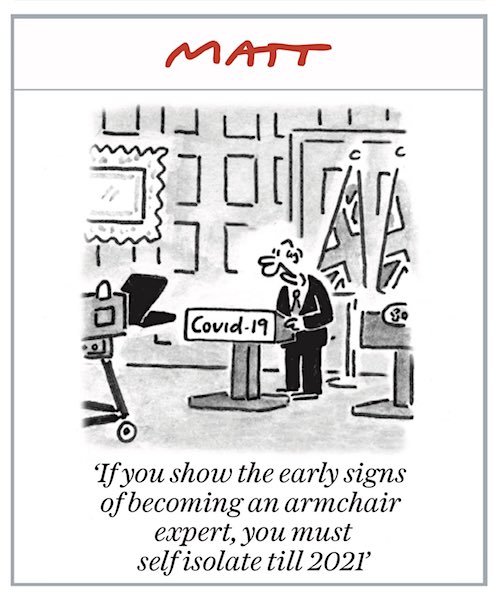

If you read us, please support us. Help the Automatic Earth survive.








Home › Forums › Debt Rattle March 17 2020